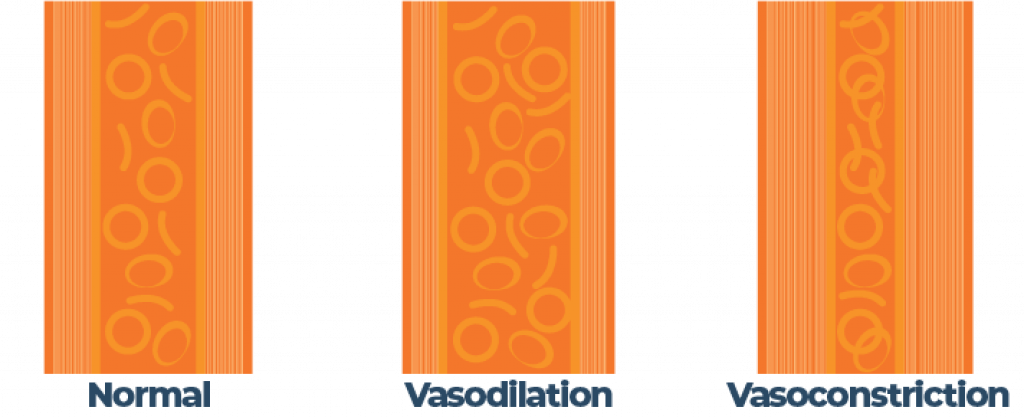Do you ever wonder why you feel sleepy after enjoying a hot day in the sun? Even just lounging at the beach leaves you craving an afternoon nap.
In this article, we’ll explain the science behind why heat makes you sleepy and share important tips to stay safe and feel more awake when it’s hot out. We’ll also highlight how you can use heat to your advantage if you have problems falling asleep at night.
Heat and Tiredness
When you become hot, your body will work in overdrive to keep you cool and maintain a safe internal temperature. All that hard work can leave you feeling sluggish.
The hypothalamus[1] is a part of the brain that controls bodily functions, and it works with other parts of the body, including the sweat glands, skin, and blood vessels, to keep your temperature in check.
How the Body Regulates Temperature
Sweating
One method your body uses to stay cool is sweating – or perspiration. Everyone’s body is made up of sweat glands, which is where sweat is produced. Human perspiration[2] is mostly water, but it also contains small amounts of salt, sugar, ammonia, and urea.
The sweat will then exit through tiny holes in your skin called pores. As the sweat hits the air, it evaporates off your skin, which helps you remain cool.
Vasodilation

Another way your body naturally cools itself is through a process called Vasodilation.[3] During this process, your blood vessels become dilated, allowing more blood to flow to the skin’s surface to cool down the warm blood there. This is also why some people’s skin may appear more red when they’re hot.
Find Out More: Thermoregulation Guide
More Ways Heat Makes You Sleepy
In addition to your natural cooling system, there are other ways your body is affected by the heat that can leave you worn out.
You Become Dehydrated
Dehydration[4] occurs when your body loses more fluids than you’re taking in. When you’re sweating, you are losing fluids more rapidly, and if you’re not replenishing them, you will likely become dehydrated. One of the effects of dehydration is fatigue.
Dehydration can also lead to more severe health conditions, including heat exhaustion, heatstroke, urinary and kidney problems, seizures, and hypovolemic shock. Anyone is vulnerable to the effects of dehydration, but it is more dangerous for young kids and older adults.
Drop In Blood Pressure
As previously mentioned, people who are hot may experience dehydration and increased blood flow to the skin. This can, in turn, lead to low blood pressure[5] – or hypotension. Fatigue is one of the symptoms of low blood pressure.
Hypotension also puts you at a higher risk of dizziness, fainting, and falls, which can be especially hazardous for older adults.
Emotional Connection
It’s not just the physical effects of heat that can make you feel drowsy; there’s also a psychological reason.
Sometimes you’ll come across a certain song or smell, and you’re instantly reminded of a specific time or place in your past. When you associate something so strongly with a feeling, it often becomes linked.
We typically associate rest with feeling warm and cozy under the blankets or comforter of our bed. So, when you’re warm, it’s easy for your mind to think of this as sleep time and for you to react accordingly.
Sunburn Can Make You More Tired
Too much time in the sun without proper skin care can make you feel even more sleepy. When you develop a severe sunburn[6], this can exacerbate the effects of dehydration and possibly send you into shock. When you’re in shock, you might experience low blood pressure, fainting, and extreme weakness.
Heat Exhaustion
In some cases, your body can’t keep up, and you may develop what is known as heat exhaustion[7]. This is when your body becomes overheated.
Heatstroke is the most serious of the heat-related conditions and can be life-threatening.
Symptoms of Heat Exhaustion
- Cool, moist skin
- Dizziness
- Fainting
- Fatigue
- Extreme sweating
- A weak or rapid pulse
- Low blood pressure while standing
- Muscle cramps
- Nausea
- Headache
How to Feel More Awake on Hot Days
Just because heat can make you sleepy doesn’t mean it has to. Taking preventive measures such as buying a cooling mattress to stay safe should also keep you more awake and alert when temperatures rise.01
Drink Plenty of Water
To help curb dehydration and its sleep-inducing effects, you should drink lots of water. While you may not feel thirsty, if you’re sweating, you need to replenish the fluids that you’re losing. Not all fluids are helpful, though. Hackensack Meridian Health suggests avoiding caffeinated beverages and alcohol.
Get Some Shade
Peak heat hours are usually from 10:00 am to 4:00 pm. You should limit your sun and heat exposure by either staying indoors or taking breaks in the shade during this time.03
Put On Sunblock
Be sure to protect your skin from sun damage and additional dehydration by wearing sunscreen. Most experts suggest an SPF of at least 30. Hats and sunglasses can also help keep you from getting too much sun.04
Wear Loose-Fitting Clothes
On extra-warm days, stick to wearing loose clothing made of natural and breathable fabrics like cotton and linen. You should also steer clear of synthetic materials since these lock in heat.
Avoid Cooking
Using your stove or oven on a hot day can make your home even warmer. Instead, opt for using a microwave to warm up foods or eating fresh meals like salads.06
Change Your Workout Routine
During summer, try adjusting your workouts[8] to the early morning or evening when the weather is cooler. You can also mix up your fitness routine by incorporating swimming, which is an excellent way to exercise and stay cool at the same time.
How Heat Could Help If You Have Trouble Sleeping at Night
For those who struggle to sleep at night, try using heat to your advantage.
The human body has a 24-hour sleep-wake cycle that is regulated by a circadian rhythm. This internal system also affects our body temperature, and at night, the circadian rhythm lowers our core temperature to initiate sleep.
Despite the body’s natural method to prepare us for bed, many folks still have difficulty falling asleep. According to research, a rapid decline in core temperature may help the sleep initiation process[9]. Therefore, attempting to emulate this should help you sleep.
Try taking a hot bath, using a sauna before bed, or having a glass of warm milk to make your temperature rise. Then, allow your temperature to drop to help induce sleep.

Jill Zwarensteyn
Editor
About Author
Jill Zwarensteyn is the Editor for Sleep Advisor and a Certified Sleep Science Coach. She is enthusiastic about providing helpful and engaging information on all things sleep and wellness.
Combination Sleeper
Sources and References:
[1] “How the Body Regulates Heat”, Rush
[2] “What’s Sweat?”, Kids Health
[3] Nisha Charkoudian, “Skin Blood Flow in Adult Human Thermoregulation: How It Works, When It Does Not, and Why”, Mayo Clinic, 2003.
[4] “Dehydration”, Mayo Clinic, September 19, 2019.
[5] “Is Hot Weather Dangerous for People with High Blood Pressure?”, Hackensack Meridian Health, July 15, 2020.
[6] “Sunburn”, Johns Hopkins Medicine
[7] “Heat Exhaustion”, Mayo Clinic, November 10, 2020.
[8] “5 Ways to Stay Safe in Extreme Heat”, Hackensack Meridian Health
[9] P. J. Murphy, S. S. Campbell, “Nighttime drop in body temperature: a physiological trigger for sleep onset?”, National Center for Biotechnology Information